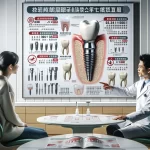Dental implants have become a popular solution for replacing missing teeth, offering a blend of durability and aesthetic appeal. However, they are not the ideal choice for everyone. This article delves into the reasons why dental implants might not be the best option for you, providing a comprehensive overview of potential drawbacks while also considering the benefits. By understanding both sides, you can make an informed decision about your dental health.
Understanding Dental Implants
Dental implants are artificial tooth roots made of titanium that are surgically placed into the jawbone. Once healed, they support crowns or bridges that mimic the appearance and function of natural teeth. While implants can significantly improve quality of life, they come with considerations that may deter some individuals.
1. Cost Considerations
Potential Drawback
One of the most significant barriers to dental implants is their cost. The average price for a single dental implant in the United States ranges from $3,000 to $4,500, depending on various factors such as location, dentist experience, and additional procedures required. This price tag often includes:
- Consultation fees
- Implant placement
- Abutment and crown fabrication
Additional procedures like bone grafting or sinus lifts can further increase overall expenses. Many dental insurance plans categorize implants as elective procedures, leading to limited coverage options.
Balanced Perspective
Despite the high upfront costs, dental implants can be more economical over time due to their longevity and minimal maintenance needs compared to alternatives like dentures or bridges. Many dental practices offer financing plans that can make implants more accessible for patients concerned about immediate costs.
| Cost Breakdown | Estimated Price |
|---|---|
| Single Dental Implant | $3,000 – $4,500 |
| Bone Grafting (if needed) | $300 – $3,000 |
| Abutment and Crown | $1,000 – $3,000 |
| Total Estimated Cost | $4,300 – $10,500 |
2. Surgical Procedure and Recovery Time
Potential Drawback
The process of receiving dental implants is surgical and involves inherent risks. It typically requires multiple appointments over several months. Potential complications include:
- Infection
- Nerve damage
- Sinus problems (for upper jaw implants)
Recovery may involve discomfort, swelling, and dietary restrictions during the healing phase.
Balanced Perspective
While surgery does carry risks, complication rates for dental implants are low when performed by experienced professionals. Many patients report that the procedure is less uncomfortable than anticipated. The long-term benefits often outweigh temporary discomfort.
3. Not Suitable for Everyone
Potential Drawback
Certain health conditions or lifestyle choices may disqualify individuals from being suitable candidates for dental implants. Factors include:
- Uncontrolled diabetes
- Heart disease
- Active gum disease
- Smoking habits
Additionally, insufficient bone density in the jaw may necessitate preliminary procedures before implant placement.
Balanced Perspective
Advancements in dental technology have broadened the pool of suitable candidates. For those who cannot receive implants due to health concerns or lifestyle factors, alternatives such as bridges or dentures remain viable options.
4. Potential for Implant Failure
Potential Drawback
Although rare, dental implants can fail—requiring removal and potentially additional procedures. The success rate for dental implants is high (typically between 95% and 98%), but failures can occur due to factors such as:
- Poor oral hygiene
- Smoking
- Certain medical conditions
Failed implants may need to be replaced at additional costs.
Balanced Perspective
While implant failure is a concern, proper care and regular dental check-ups significantly reduce this risk. The high success rate and long-term durability make implants a reliable option for many patients.
5. Time Commitment
Potential Drawback
The entire process of obtaining dental implants—from initial consultation to final restoration—can take several months. A straightforward case typically spans 3-6 months, while more complex cases involving bone grafting or multiple implants may extend up to a year or more.
Balanced Perspective
Although the time commitment is significant, many patients find that the long-term benefits justify the wait. Temporary prosthetics can often be used during healing to maintain appearance and function.
6. Maintenance Requirements
Potential Drawback
Dental implants require ongoing care similar to natural teeth to ensure longevity:
- Regular brushing and flossing
- Routine dental check-ups
Special cleaning tools may be necessary to clean around implants effectively, as there is a small risk of developing peri-implantitis—an inflammatory condition affecting surrounding tissues.
Balanced Perspective
The maintenance required for implants mirrors that of natural teeth; many patients find it becomes a natural part of their oral hygiene routine. Proper care minimizes the risk of peri-implantitis.
7. Psychological Adjustment
Potential Drawback
Some patients may need time to adjust psychologically to their new dental implants. It can take time to acclimate to the feel of artificial teeth in one’s mouth; anxiety regarding surgery or concerns about permanence may arise.
Balanced Perspective
Most patients adjust quickly and report high satisfaction with both function and aesthetics post-surgery. Many find that their confidence and quality of life improve significantly after receiving implants.
Conclusion: Making an Informed Decision
Dental implants offer a highly effective solution for missing teeth but come with potential drawbacks that deserve careful consideration. By weighing these factors against benefits such as improved oral health and enhanced appearance, you can make an informed decision regarding your dental health.
Before proceeding with any decision:
Consult with a qualified dental professional to assess your individual case.
Consider your overall health and lifestyle alongside your long-term oral health goals.
Explore all available tooth replacement options and weigh their pros and cons.
Factor in both short-term costs and long-term value when making your decision.
Ultimately, choosing whether to get dental implants should be based on a thorough understanding of both potential drawbacks and benefits in consultation with professionals who can provide personalized advice tailored to your unique situation.
Frequently Asked Questions (FAQs)
Are dental implants suitable for everyone?
Dental implants are an excellent solution for many; however, they may not be suitable for everyone due to factors like bone density and general health. Consulting with a dental professional is crucial for assessment.
How long do dental implants last?
With proper care and maintenance, dental implants can last a lifetime as they are designed as a long-term solution for tooth replacement.
What is the success rate of dental implant surgery?
Dental implant surgery has a high success rate—typically above 95%—though success depends on various factors including oral health and adherence to post-surgical care guidelines.
Can dental implants fail? What causes failure?
While rare, failures can occur due to poor osseointegration or infection among other factors. Regular check-ups and good oral hygiene practices significantly reduce these risks.
How should I care for my dental implants after surgery?
Post-surgery care typically includes following your dentist’s instructions on oral hygiene practices—such as regular brushing and flossing—and avoiding certain foods during healing while ensuring follow-up appointments are attended regularly.







